Week 85: The Curtain Goes Down on the Ukrainian Offensive
Week 85 of Putin's War is in the history books. The war in Ukraine was overshadowed by the horrific invasion of southern Israel by terrorists from the terrorist Hamas movement, which governs the Palestinian enclave of Gaza. Because many of the Open Source Intelligence (OSINT) accounts I rely on changed their focus to Israel, my update is not as long or detailed as usual.
The big theme, as I see it, is the attack on Israel has provided US politicians with cover for promoting an either/or option regarding Ukraine. They claimed that we could either aid Israel or Ukraine, but not both. Unless this boils over into a major regional war that looks like 1967-plus-Iran, I think that is nonsense. The weaponry Ukraine needs, primarily 155mm artillery ammunition and armored vehicles, isn't needed by Israel. Israel's stockpiles are not going to be diminished in this war. Plus, no matter how nasty the first two days were, Gaza is a very small place, and Hamas has a small force of trained terrorists.
Ukraine's principal EU backers are very unlikely to hold back aid from Ukraine to give it to Israel.
If anything, the Hamas invasion clearly demonstrated the folly of Jake Sullivan's stewardship of the National Security Council. He's the big-brain theorist behind trying to regenerate Obama's plan of making Iran a regional overlord. Sullivan's sucking up to Iran, like giving them $6 billion in hopes of mollifying them, looks precisely like the strategy of deliberately extending the war in Ukraine because he also wants to play kissy-face with Putin. The result is the most Israeli deaths since the Yom Kippur War and thousands of Ukrainians dead and crippled.
Last week, the most important battle for Ukraine was in the US House of Representatives, where Speaker Kevin McCarthy was removed from office. In a shocking turn of events, the winner of the vote in the GOP caucus, Steve Scalise, has withdrawn from the race (BREAKING: Steve Scalise Withdraws From House Speaker Race). Ideally, this will pave the way for Jim Jordan. Still, if enough GOP representatives are adamantly opposed to Jordan, we could, conceivably, end up with Speaker Hakeem Jeffries. One thing to remember about the House GOP is that they love to lose. Because when you lose, you can whine in fundraising emails, which is much easier than actually doing something. I rate this as Ukraine's most important battle because the outcome will determine what military aid looks like over the next two years.
On the ground, the Russians launched an offensive over several hundred miles of front lines. It hasn't gone anywhere so far, and with each passing day, the chances of it succeeding recede. It strikes me as a bold move calculated to force Ukraine to redistribute reserves massed in the South to stop Russian advances. The operational objective appears to have been to cut off a client containing several thousand Ukrainian troops. I have more on that later in the post.
At this point, I think it is fair to declare the Ukrainian offensive has reached a culmination point. Small unit actions will continue, particularly in the South and around Bakhmut. It is conceivable, in fact, likely, that Ukraine will retake Bakhmut over the winter. I think the chances of a large-scale, war-changing offensive have ended for 2023.
Politico-Strategic Level
Context Matters
Yesterday, National Security Council spokesman John Kirby caused crotches to tingle among Putinistas.
When answering a question about military assistance to Israel and Ukraine, he said, "In Ukraine funding, we're coming near to the end of the rope."
The whole clip shows that Kirby is discussing funding available under current appropriations. In that context, he's correct. The money appropriated to support Ukraine for FY2023 is "at the end of the rope." He's not making a pronouncement on US policy going forward. The idea that Israel is an "off-ramp" for funding is just stupid. Money appropriated to go to Ukraine goes there. It doesn't go to Israel.
Frozen Rubles Matter
Billions of dollars of Russian overseas assets have been frozen since February 24, 2022, and there has been intense international debate over what to do with the money. Belgium has made the first move by expropriating €1.7 billion in Russian assets and directing it to a fund for reconstruction. This is the type of pain that gets attention in Russia's ruling clique. Dead mobiks don't matter; depleted asset ledgers do.
About $300 billion is at stake, and none of it will end up back in Russia.
IOC Suspends Russian Membership
The International Olympic Committee has suspended Russia's membership. The reason is that Russia tried to absorb the regional Olympic committees of the Ukrainian oblasts it illegally annexed.
Since the Cold War's early days, international sporting competition was where the USSR, and now Russia, attempted to showcase its claim to superiority. This is just another example of Russia's deteriorating diplomatic clout in the world.
Ammunition Production Diversifies
As I've noted several times, there is a vast amount of mis- and disinformation on artillery shell production for the Ukrainian Army. Other than the US, there are 11 countries producing artillery ammunition for Ukraine. The number is 12 if you count the production by Ukraine's domestic manufacturing capacity; see Week 73. Putin Eludes Arrest, Black Sea Grain Initiative Dies, and Ukraine's Offense Continues to Grind Away.
Last week, the US awarded contracts to three additional countries for artillery production in addition to yet another increase in US domestic production. This brings production lines from the US and 14 other countries online...in addition to what South Korea is doing behind the scenes.
Operational Level
The major story on the battlefield was Russia launching an offensive on a broad front.
From north to south, the areas are Lyman-Kupiansk in Kharkiv and Berdychi-Krasnohorivka, Avddivka, and Novomykhailivka in Donetsk. The weight of the battle fell on the southern areas in Donetsk, with the schwerpunkt, or main effort, being to eliminate the Ukrainian salient at Avdiivka.
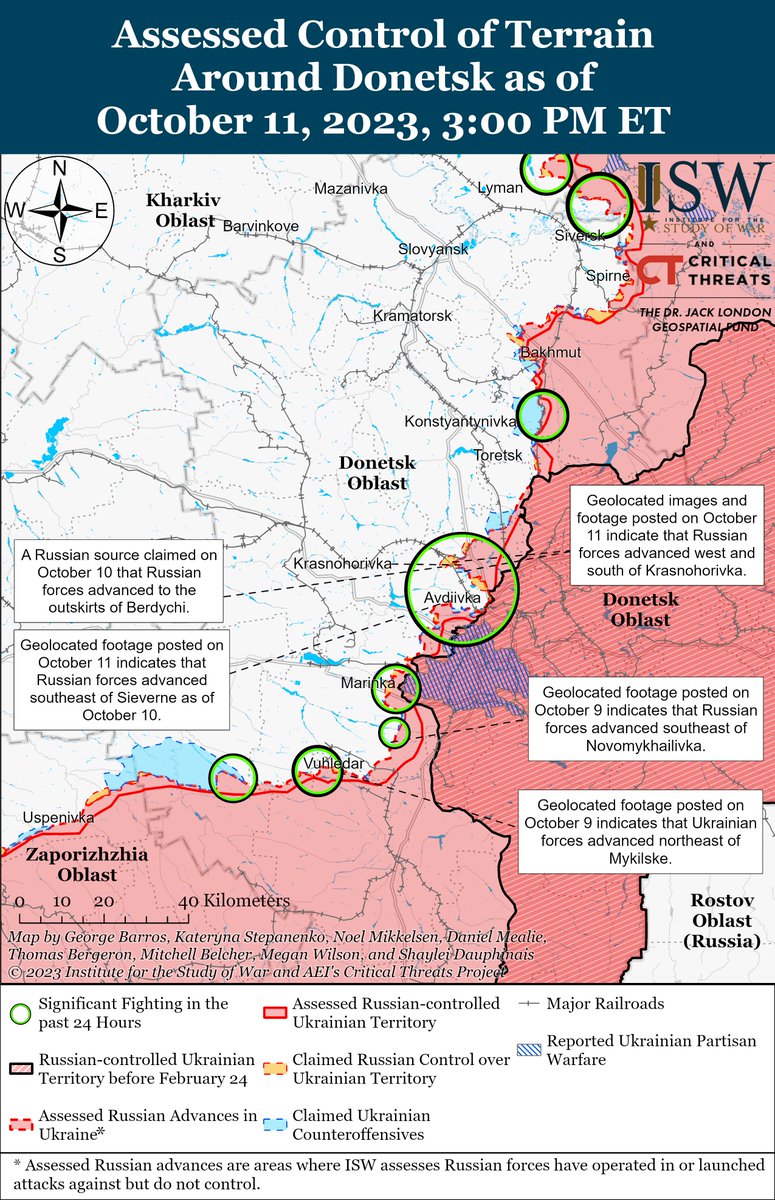
At this writing, there are no geo-confirmed claims of more than minor Russian gains. There is visual evidence that most of the attacks didn't accomplish much, and in some places, they may have resulted in losing ground.
We'll cover all that down thread.
Shell Hunger Approaches Shell Famine
Last winter, Wagner Group poohbah Yevgeny Prigozhin complained that his troops were getting slaughtered in Bakhmut because of "shell hunger." See Week 52. US and China Face off, Prigozhin Goes for the Jugular, Mystery Weapon Strikes, and Happy Anniversary for more information. Even though there was a suspicion that Wagner was being deliberately deprived of artillery support, Ukrainian Army reports showed Russian artillery ammunition expenditures declined from the 60,000+ rounds per day fired in the autumn of 2022 to about 20,000 rounds per day during the winter fighting. That number seems to have dropped again.
The volume of fire by Russian artillery was never sustainable for two reasons. The rate of fire greatly outstripped the inventory of ammunition and ammunition production, and Russian artillery tubes could not physically sustain that level of shooting. Even if ammunition was unlimited, guns were wearing out and needed refurbishing in a factory environment.
The Ukrainians have the same problem, but smaller. The guns are rebuilt in Poland and returned to action; they have more precision-guided mentions and dual-purpose improved conventional munitions (DPICM) that require fewer rounds to service a target than relying on WWII-style barrage fire.
Attacks on Ports Continue
This Probably Isn't Having the Effect You Think You're Having
Farther down in this post, I cover a missile attack on the Ukrainian village of Hroza, where literally a third of the population was killed. The missile strike targeted a funeral. This is how Russia's UN Ambassador, the troglodyte Vasily Nebenzya, defended the incident.
Watching the horrific assault against Israeli civilians in Southern Israel and the hijinks of Russian troops, one is left with the inescapable conclusion that the only real difference between the Russian government and Hamas is that Hamas doesn't drink as much vodka.
This Is Nucking Futs
New Weapons
Russia Receives North Korean Artillery
North Korean ammunition is already in use.
MSI-DS Terrahawk Paladin
Britain is sending an undetermined quantity of 30mm Terrahawk Paladin guns to Ukraine. These are containerized, stationary guns for point defense of critical infrastructure. They are optimized for use against drones. Information on the system is sketchy; the only site carrying it is the manufacturer's webpage.
Combat Operations
Reach Exceeding Grasp
There is no doubt that Russia has rolled the dice in a big way with the current offensive. Their problem was much the same one that the Ukrainians encountered in June. That is converting small gains by light infantry into a breakthrough. There is often the impulse to do too much too fast. Here, what looks to be a Russian mechanized infantry company was caught on a single road, the lead vehicles knocked out, and then artillery went to work. The lack of march discipline says none of the vehicle drivers or commanders were even marginally trained.
Tactics, Techniques, and Procedures
Drivers' Training...It Is Still Important
In fairness, if you placed a scissor bridge to increase the chance that a tank would flip, that's pretty much how you'd do it.
Northern Front
Kharkiv
Kupiansk-Svatove-Kreminna
There was heavy fighting in this area, but very little territory was gained or lost. The orange areas show areas that are contested.
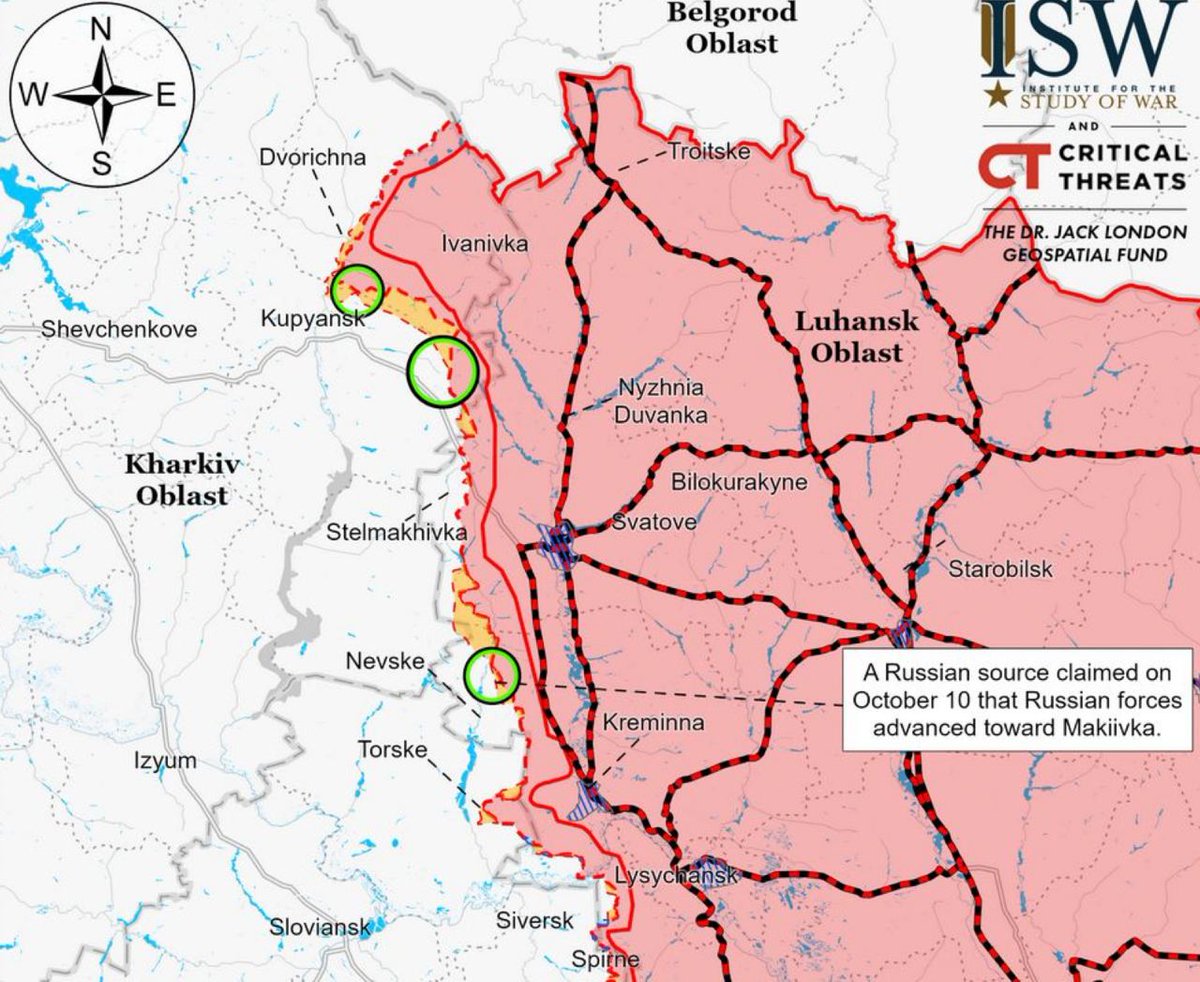
The Russians seem to have suffered significant losses.
This represents the loss of half a Russian tank battalion in a very small space.
Terror Attack
The attack was so severe that even the Austrians couldn't avert their eyes.
Donbas
Bakhmut-Klishchiivka-Andriivka
The lines in this area have stabilized. No measurable gains were made by either side.
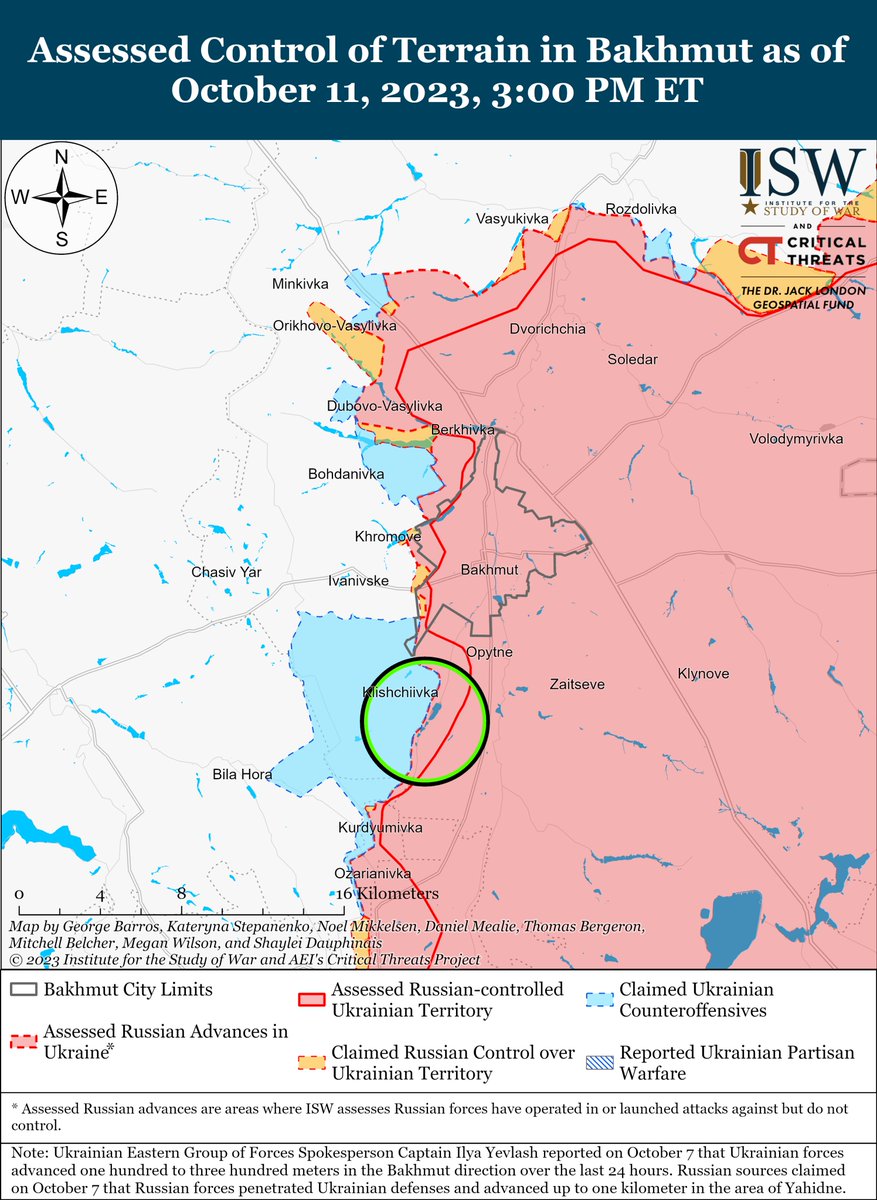
Avdiivka (including Berdychi, Krasnohorivka, and Novomykhailivka)
On Monday, the Russians launched a broad attack at the shoulders of this salient, trying to create a "cauldron," as the vatniks like to call an encirclement. These suffered some minor successes, and the fighting is continuing. Ukrainian forces in the area do not appear to be in danger of an operational encirclement. It remains to be seen if the Russians can hold onto the ground they gained or resist a Ukrainian counterattack if it materializes.
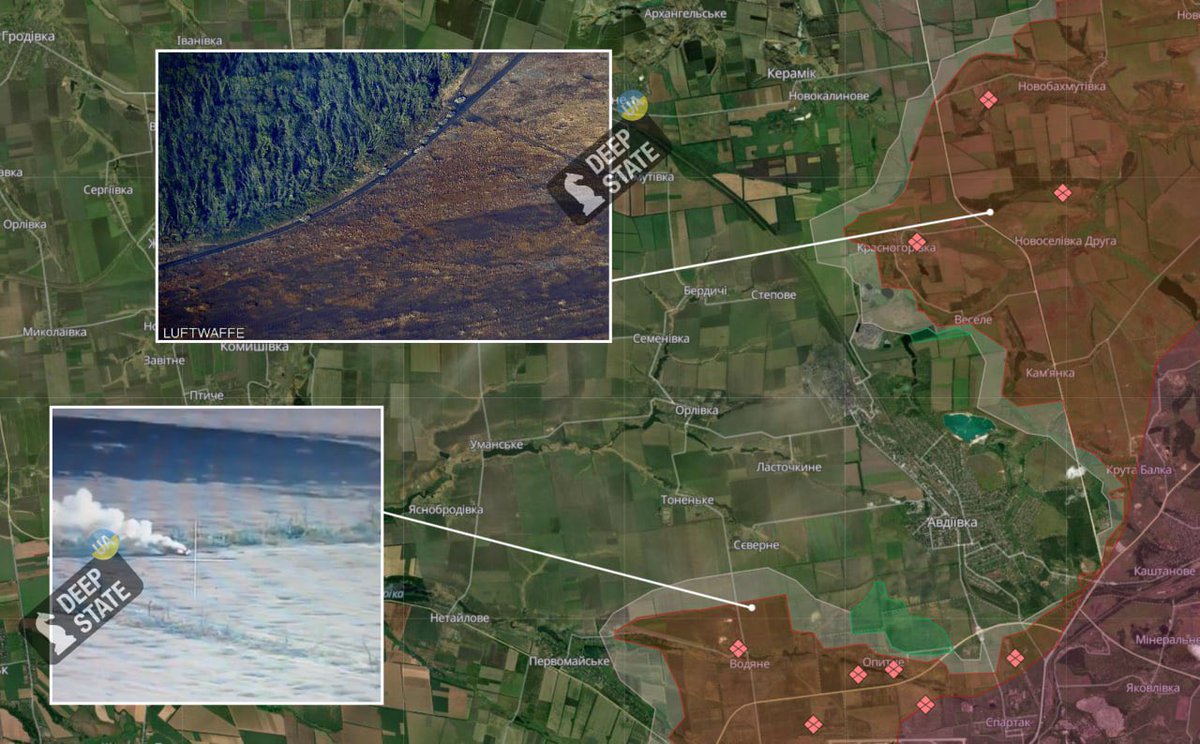
The attacks in this sector were aggressively executed but didn't, in my view, seem terribly well thought out. I've already featured one video from this sector (the tank column stuck on a one-lane road). Here is another attack in the same sector.
Urozhaine
More Friendly Fire
Last week, I posted about a Russian Su-35 strike aircraft downed near Tokmak by a Russian surface-to-air missile. The Russian aviation blogger Fighterbomber on Telegram reports another Su-35 shot down at Nikolske outside Mariupol.
This is the fifth Russian aircraft known to have been downed by friendly fire since the invasion started.
Two aircraft dropped in as many weeks indicates a weakness of the IFF methods in use by the Russian Air Force, perhaps due to the loss of experienced personnel, an extreme jumpiness by the missile crews, or both.
Southern Front
Zaporizhzhia
Robotyne-Verbove- Novoprokopivka
Fighting continues in this area, and the Ukrainians continue to make marginal gains. The front lines are largely unchanged, but the Ukrainians seem focused on capturing Novofedorivka (green highlight). Taking that town will force the evacuation of Verbove and open a wide gap in the Russian lines.
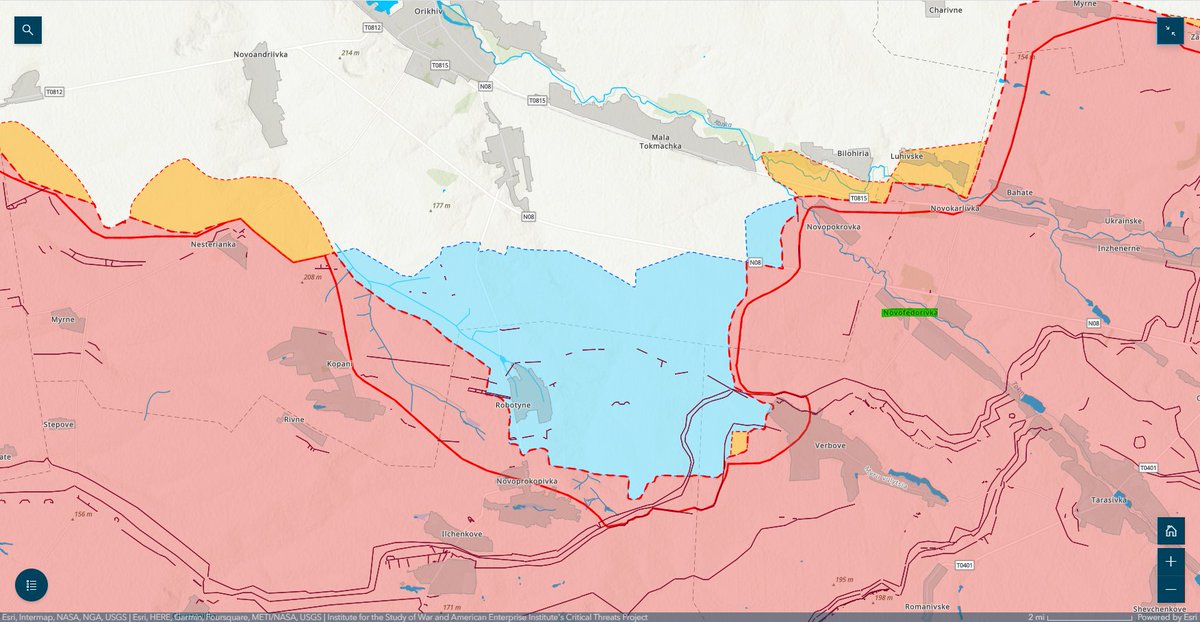
Kherson
The action here is characterized by small unit operations using the Dneiper and contiguous waterways as primary lines of communication. Ukraine retains possession of a bridgehead at the site of the ruined Antonovsky Bridge.
Ambush
Here, a Ukrainian patrol on the left bank of the Dneiper ambushes a Russian vehicle. Were I the lane grader, I'd probably flunk the patrol leader for letting the truck drive through the kill zone and engaging it from the rear. But, on the other hand, it worked.
Rear Areas
Crimea
Naval Friendly Fire
Rumors have been circulating that the Project 22160 patrol ship Pavel Derzhavin was damaged due to an explosion near Sevastopol. The Ukrainian Navy has confirmed damage to the ship, but it is not claiming responsibility. The ship was on duty protecting the Kerch Strait Bridge and was damaged as it returned home. Multiple sources say it was damaged by a Russian mine.
What's Next
The next phase of the war has three components.
Most critical is maintaining the viability of the coalition supporting Ukraine. I don't think the Israel-Hamas war will have any material impact there, and I think the fighting will end before it has a chance to have a political impact in the Ukraine War. That said, the winner of the House Speakership will have some influence. Speaker Scalise would have continued with McCarthy's program. Speaker Jordan will probably be more skeptical, but the fact remains that a supermajority in the House supports Ukraine. The same applies to the Senate. For now. I think that unless some massive scandal breaks that causes multiple members of the coalition to bolt, then Ukraine funding is safe.
The second factor is the outcome of the ongoing Russian offensive. My personal view is that the Russian general staff asked Russian units and soldiers for a lot more than they had. The offensive defies the principle of war "Mass" by not achieving overwhelming superiority at any one point. There is no indication that Russia could logistically sustain a major advance; more importantly, the Russians don't have an answer for the qualitative superiority of Ukrainian artillery. I really think this was a plan to stop the Ukrainian advance in the South until the weather stopped fighting and use that time to un-f*** their situation. This might succeed but will do so at a high price in men and equipment. Don't be surprised to see Russian units mauled in this offensive give ground in the next few weeks.
Finally, Ukraine has to keep up the pressure in the South. They must continue the attrition of elite Russian forces being used as fire brigades to stop penetrations. They must demolish Russian radar, command and control, electronic warfare, and logistics sites. We know an affirmative decision on ATACMS has been reached and is awaiting Biden's approval. They also need to rebuild. We also know that beginning in February/March, the life of Russian pilots will be a lot more interesting with the arrival of the first F-16s.
Look for small actions over the winter, but keep an eye out for that giant "black swan" event that changes everything.





Post a Comment